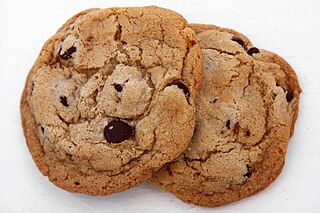
A cookie, or a biscuit, is a baked or cooked snack or dessert that is typically small, flat and sweet. It usually contains flour, sugar, egg, and some type of oil, fat, or butter. It may include other ingredients such as raisins, oats, chocolate chips, nuts, etc.

Jaffa Cakes are a cake introduced by McVitie and Price in the UK in 1927 and named after Jaffa oranges. The most common form of Jaffa cakes are circular, 2+1⁄8 inches (54 mm) in diameter and have three layers: a Genoise sponge base, a layer of orange flavoured jam and a coating of chocolate. Each cake is 46 calories. Jaffa Cakes are also available as bars or in small packs, and in larger and smaller sizes. The original Jaffa Cakes now come in packs of 10, 20, 30, or 40, having been downsized in 2017 from 12 or 24 per pack.
United Biscuits (UB) is a British multinational food manufacturer, makers of McVitie's biscuits, Jacob's Cream Crackers, and Twiglets. The company was listed on the London Stock Exchange and was once a constituent of the FTSE 100 Index. In November 2014, the company was acquired by Yıldız Holding and is now part of Pladis.

McVitie's is a British snack food brand owned by United Biscuits. The name derives from the original Scottish biscuit maker, McVitie & Price, Ltd., established in 1830 on Rose Street in Edinburgh, Scotland. The company moved to various sites in the city before completing the St. Andrews Biscuit Works factory on Robertson Avenue in the Gorgie district in 1888. The company also established one in Glasgow and two large manufacturing plants south of the border, in Heaton Chapel, Stockport, and Park Royal, London. There are seven McVitie's factories in the UK, with each producing a different types of biscuit; the Harlesden site in north-west London manufactures the chocolate digestives.

Crvenka is a small town located in the municipality of Kula in the West Bačka District, Autonomous Province of Vojvodina, Serbia. The town has a Serbian ethnic majority, and it had a population of 9,001 in 2011.

Štark is a food manufacturing company based in Belgrade, Serbia. The main products of the company include candies, biscuits and chocolates. One of its hallmark products is Najlepše Želje a chocolate bar that means "Best Wishes" in Serbian.

Bambi a.d. is a food manufacturing company headquartered in Požarevac, Serbia. One of its signature products is a biscuit called Plazma, also known as Lane outside of former Yugoslavia.

Telekom Srbija a.d. Beograd is a Serbian state-owned telecommunications operator. It was founded in May 1997 as a joint-stock company, by spinning off the telecommunications business from PTT Srbija. In April 2015, Telekom Srbija started providing all services in Serbia under the mts brand.

Naftna Industrija Srbije is a Serbian multinational oil and gas company with headquarters in NIS building, Novi Sad, Serbia. NIS is one of the most profitable companies in Serbia and one of the largest domestic exporters. It employs around 11,000 people in Serbia and the region. As of May 2022, Gazprom Neft is the largest shareholder with 50% of NIS shares, followed by 29.87% owned by the Government of Serbia, 5% owned by Gazprom and rest by minority shareholders.
Srbijagas is the state-owned natural gas provider in Serbia with headquarters in Novi Sad.

Serbia Broadband is a cable television and broadband internet service provider in Serbia. The SBB company operates as part of the United Group, leading media and telecommunication operator in Southeastern Europe. The company is based in the "Telepark" business complex in Belgrade, which includes data center covering 750 square meters of floor space and divided into 20 server halls and technical support areas.

Imlek a.d. is a Serbian food company based in Belgrade, Serbia. It is specialized in processing milk and produces dairy products.
Swisslion Group is a Serbian multinational food and drinks manufacturer headquartered in Novi Sad. Its products are produced in its factories located in Croatia, North Macedonia, Serbia and Bosnia and Herzegovina.
Pladis Global is a British confectionery and snack foods company encompassing United Biscuits, Ülker, Godiva Chocolatier and DeMet’s Candy Company. It was formed in January 2016 as a subsidiary of Yıldız Holding with its headquarters in London, England. The company operates 24 bakeries in 11 countries and its products reach approximately 4 billion people worldwide in 120 countries across Europe, the Middle East, Africa, Asia and the Americas.

Moj Kiosk Group is a Serbian holding company with headquarters in Belgrade, Serbia. It has five subsidiaries and performs variety of services, such as distribution and retail of consumer goods, newspapers, non-alcoholic beverages and confectionery through "Moj Kiosk" convenience stores.
Invej is a Serbian trading company headquartered in Belgrade.
Plazma is a brand of soft biscuits owned by Bambi A.D. It was introduced in 1967 in Serbia as a cheaper and more widely available alternative to Plasmon, or a direct competitor to Petit Beurre made by Kraš. It is also known as Lane in Western Europe and the Americas since the 1990s.













